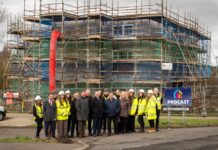
NEW research has revealed construction workloads in Scotland fell ‘broadly flat’ through the final quarter of 2024, however surveyors are more optimistic about the year ahead.
The findings are reported in the latest Royal Institution of Chartered Surveyors (RICS) Construction Monitor. A net balance of -3% of respondents in Scotland reported a fall in workloads.
Activity in both infrastructure and private industrial rose marginally, with workloads in private commercial falling flat. Net balances of the rest of the sub-sectors were all in negative territory: public housing (-22%), private housing (-4%), and other public works (-15%).
Although workloads overall remain subdued, surveyors are optimistic on the 12-month horizon. A net balance of 23% of Scottish respondents expect workloads to rise over the next year, which is above the UK average of 20%.
Scottish surveyors are also more optimistic on the outlook for profit margins. A net balance of 13% of respondents anticipate profit margins to rise through 2025 – the first time since mid-2021 this balance has been in positive territory.
Shortages of skilled workers remains an issue, with 49% of survey respondents noting a lack of quantity surveyors, down from 57% in the last survey. 38% noted a shortage in other construction professionals, down from 48% the quarter previous, while 35% reported a shortage in bricklayers – the lowest this figure has been since early 2021.
Andrew McLeman of McLeman QS Network Ltd in Edinburgh said, “Demand remains fairly static. Work is still coming in but not at a high volume.”
Alan Thomson of McGowan Miller Construction Consultants in Dumfries added, “We are getting a lot of enquiries for budget costs for potential projects but very few of these are progressing to design/construction stage.”
Jonathan Howarth of Jon Howarth Chartered Surveyor in Portree commented, “Issues include materials delivery from some suppliers to remote areas and limited availability of subcontractor accommodation in tourist locations.”
Commenting on the UK picture, RICS chief economist Simon Rubinsohn said, “Although the overall tone of the latest RICS Construction Monitor is a little subdued, the more positive assessment of the outlook foreshadowed, at least in part, some of announcement’s the chancellor made in her recent speech. That said, respondents to the survey continue to highlight just how important it is to follow through on the plans to address some of the barriers presented by the current planning regime.
“Moreover, contributors also once again raise the issue of capacity when it comes to delivering on the ambitious goals of the government. Labour shortages continue identified as a meaningful obstacle to getting Britain building.”








